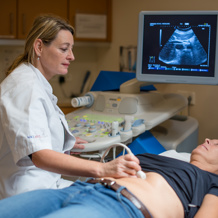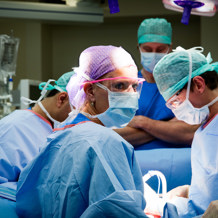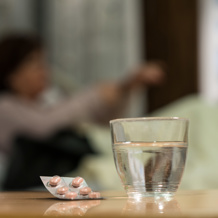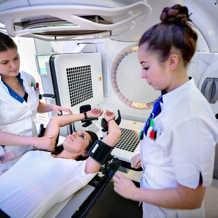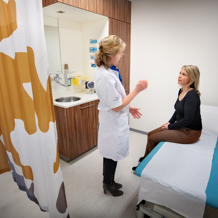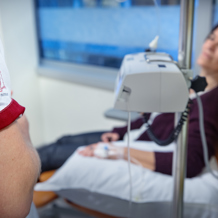Breast cancer
Find out more about breast cancer symptoms, the various types, the most common tests, and treatment options on this page, as well as an overview of frequently asked questions.
Click here for more information about our NKI breast cancer center, our specialists, our patient satisfaction ratings, trials, and innovations.

Symptoms breast cancer
Have you noticed one of the following changes to your body? That doesn’t mean that you have breast cancer, although we do recommend coming in for a check-up.
- a lump or dimple in the breast;
- a sunken nipple;
- eczema around the nipple;
- bloody nipple discharge.
Breast cancer can develop in the breast tissue of both men and women. It is most commonly diagnosed in women between 50 and 70 years old. It can be hereditary.
The cause of breast cancer is usually unclear. Breast cancer is more common among women who:
- started menstruating relatively early and reached menopause relatively late.
- don’t have children, or had their first pregnancy after the age of 35.
- have been using a heavier birth control pill since they were young, or have been taking hormone replacement therapy pills to relieve menopausal symptoms.
- have an unhealthy lifenostyle; not enough exercise, too much alcohol, smoking, or an unhealthy weight.
rapid diagnostics
If you suspect breast cancer, you can contact us with a referral from your general practitioner. We can usually see you after about four to five weekdays, and you will usually have the diagnosis within 2 hours.
I have been diagnosed with breast cancer
You just heard that you have breast cancer. You might have many doubts and questions. We can help alleviate your anxiety by answering all your questions clearly and concisely.
If you are interested in a second opinion, or if you would like to receive treatment at our hospital after receiving your diagnosis elsewhere, you can come to our hospital on short notice for a consultation. All patients coming in for a second opinion will be evaluated by a multidisciplinary team, which includes all our breast cancer specialists. Afterward, we can offer you a suitable and thorough treatment advice, often on the same day.
Second opinion
You can usually get a second opinion within seven days
Diagnosis
Your diagnosis will be reviewed by a multidisciplinary team. This means that several specialists with a specialization in breast cancer will discuss your case, in order to come up with the best treatment plan for you. We will give you a clear and honest explanation of all treatment options, their success rates and their effects, so you can make an informed decision on your preferred treatment plan.
Frequently Asked Questions
What is breast cancer?
Breast cancer, also known as mammary carcinoma, is a type of cancer that develops in and around breast tissue in men and in women. Breast cancer is most commonly diagnosed in women between 50 and 70 years old, but it does occur in people of all ages. There may be a hereditary factor.
What are the different types of breast cancer?
There are many different types of breast cancer, as well as irregularities that aren’t breast cancer but might develop into cancer (such as ductal carcinoma in situ; DCIS):
- Invasive carcinoma NST
- Invasive lobular carcinoma
- Lobular carcinoma in situ (LCIS)
- Hormone-sensitive breast cancer
- HER2-positive breast cancer
- Triple-negative breast cancer
You can find more information about these types of breast cancer at kanker.nl
There is one more rare tumor type: the Phyllodes tumor of the breast. Less than one percent of all people diagnosed with breast tumors have this tumor type. Some of these tumors are benign (not cancerous), others are malignant (cancerous). The malignant type is very uncommon. It usually does not affect the lymph nodes in the armpits and the cancer only spreads in less than 5 percent of all cases.
In collaboration with the Phyllodes Foundation and our breast cancer surgeon dr. Frederieke van Duijnhoven, we have developed a website dedicated to this tumour type: Phyllodes tumoren.
What causes breast cancer?
The causes of breast cancer are often not clear, although there are several personal factors that can affect someone’s chances of developing this type of cancer:
- People who start menstruating relatively early, and reach menopause relatively late
- People who don’t have children, or have their first pregnancy after the age of 35
- Long-term use of heavy hormonal birth control pills at an early age and/or long term hormone replacement therapy to alleviate menopausal symptoms
- An unhealthy lifestyle; not enough exercise, too much alcohol, smoking, or an unhealthy weight.
What are the symptoms of breast cancer?
Please consider consulting a doctor if you experience the following physical changes:
- a lump or dimple in the breast
- a sunken nipple
- eczema around the nipple
- bloody nipple discharge
How can I request a second opinion at the AVL?
Please contact your practicing physician at your current hospital or your general practitioner. He or she can submit your request digitally here, together with any further medical information and test results. Any visual materials can be submitted by mail on a CD-ROM. It might take some time before all materials have arrived, but once your submission is complete, our medical team will review your request and our Planning department will contact you to schedule an appointment.
At what point during my treatment should I request a second opinion?
It never hurts to request a second opinion. We can help you the most before the start of your treatment. Once our specialists have offered you their advice about your treatment plan, you are free to decide where you want to receive your treatment. If you are already receiving your treatment, we usually recommend that you continue at the hospital you started at, unless you are eligible to participate in a trial.
My specialists have discussed my case and treatment plan with specialists from the NKI. Is this the same as a second opinion?
Our Netherlands Cancer Institute specialists offer advice to various other hospitals in the Netherlands. They discuss patient cases and share their knowledge. Sometimes they recommend a transfer so the patient can be included in a suitable trial. Our advice to medical specialists might be different from our advice to the patients themselves. When consulting with other medical teams, we look at the possibilities of the hospital itself. The recommendations may also be different when our specialists can meet the patient at the Netherlands Cancer Institute.
How long will I have to wait if breast cancer is suspected?
If your general practitioner suspects breast cancer based on your screening results or a lump in the breast, you will rarely have to wait more than 24 hours before your visit. Once we have received your referral from your general practitioner we will schedule your appointment for the following day. You will usually receive your results within 2 hours on that same day. If you are diagnosed with breast cancer but need to undergo further testing, we will schedule your appointments within the same week.
When can I request a mammogram?
A mammogram will be scheduled for you if we are not sure whether chemotherapy will be necessary. Sometimes chemotherapy is essential, and sometimes it won’t be needed. If that is the case, there is no need for a mammogram. Not all health insurance providers cover the price of these breast x-rays. Please make sure to ask your health insurance provider whether yours will be covered.
What should I do if breast cancer runs in my family?
Inherited mutations play a role in a small percentage of cancer diagnoses – about 5%. If you suspect such an inherited component, please contact the Hereditary Tumor Clinic at the Netherlands Cancer Institute. We can find out whether you are at heightened risk by collecting details about your family, tracing your family tree, or DNA testing. Depending on the results of these tests, we can offer advice on periodic check-ups or preventative measures. Our specialists at the NKI Breast Cancer Centre can refer you to this clinic. All costs regarding hereditary testing are covered by your general health insurance policy. A part of the costs will be taken from your own risk.
Are there any running trials for new treatment options, and would I qualify?
On average, we have 40 running trials concerning breast cancer. Every study is aimed at a different target audience. Your practicing physician can discuss your options with you.
Can the NKI help me with plastic surgery without treatment?
Due to capacity, our plastic surgeons can only help our current patients. Most patients will receive immediate reconstructive surgery.
Where can I buy breast protheses?
For breast prostheses, visit www.semh.info and select ‘zoek erkend bedrijf’. Enter your zip/postal code, the range in which you wish to search, and select MMC under ‘Regeling’. You will see a list of all stores near you that are specialized in prostheses. You might qualify for a refund if you purchase your prostheses at a store connected to SEMH. Please contact your health insurance provider for more information.
 nl
nl
 Nederlands
Nederlands

